Edwige Charlot
Edwige Charlot
Website: http://www.edwigecharlot.com/PORTFOLIO
Instagram: @eedwige
Bio: Edwige Charlot was born in Paris, France and lives in Providence, RI. In their practice, Charlot borrows from installation, collage, and printmaking to create hybrid works and lexical visual language. Charlot creates a space for something new, a visual creole by blending and mixing mediums and techniques. Charlot has received support for her work through St. Botolph Club Foundation Emerging Artist and Maine Arts Commission Good Idea Grant. They received her BFA from the Maine College of Art. Charlot's work has been exhibited in New England, New Jersey, New York, and Oregon, among others. They were a past resident at Tides Institute & Museum of Art in Eastport, ME, the Quimby Colony in Portland, ME and the Vermont Studio Center in Johnson, VT. They live in Providence, RI with their partner and child.
Artist Statement: Trained as a printmaker and graphic designer, I employ a matrix-based approach to making two and three-dimensional works using printmaking and digital fabrication processes. In my studio practice, I grapple with issues of identity and culture across the spectrum of creole and creoleness. Visual and formal concepts in my work use a lexicon of plant motifs and silhouettes, land and water imagery, religious symbols, and tropical architecture. I often use plants as metaphors. Like human beings, plants pass traits onto their offspring. Each species is rich with its own specificity and distinction similar to cultures and peoples. Most recently, I have been interested in the symbolic motifs of water and how it represents the interconnectedness of a diasporic Creole experience. Water as a symbol for diaspora, being of one origin and many places simultaneously.
A ghost print is a reference to the original but it is not the same. The qualities of print, the sameness and differences speak to a creole. How do you find home when you never knew it? How do you find home when you are tethered to a longing that was never yours? If customs and traditions are marks, what happens to them over time? My work questions concepts of completeness, incompleteness, alchemy, hybridity, and syncretism.
I synthesize ecological, historical and cultural variables at play in my surroundings. I aspire to cultivate new ideas; to keep growing through making. I am motivated to create a space for something new, a creole, by blending and mixing — “to bring to life to the land I construct. I make to reclaim the field, the village, our home,” as presented in my artist statement.


